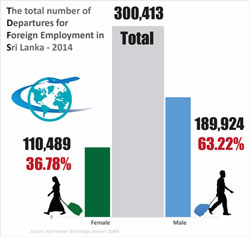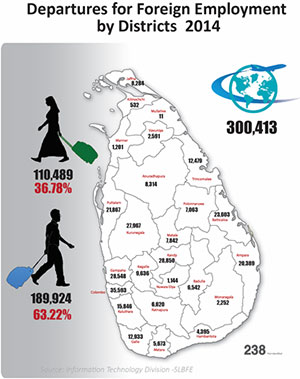
Global Knowledge Network On Voter Education - learning from each other
 The advent of universal suffrage in Sri Lanka, some 90 years ago, has steered the country's socio-political paradigm in a new and positive direction. However, close examination of Sri Lanka's representative democracy highlights a distinct area for improvement: the lack of facilitation of migrant workers to exercise their right to vote.
The advent of universal suffrage in Sri Lanka, some 90 years ago, has steered the country's socio-political paradigm in a new and positive direction. However, close examination of Sri Lanka's representative democracy highlights a distinct area for improvement: the lack of facilitation of migrant workers to exercise their right to vote.
Approximately 1.5 million Sri Lankan citizens abroad are deprived the opportunity to cast their vote. This is a significant number of voters who could considerably influence the final result of just about any election.
Voting Rights of the Sri Lankan Migrant Workers
In total, there are over 1.5 million migrant workers from Sri Lanka,whose votes are not counted in every election due to their being away from the country. This could not be regarded as a trivial omission in terms of facilitation of their rights in determining their choice in the political decision making process. Emerging global trends show that a large number of people all over the world are migrating, both legally and illegally, in search of employment in developed countries. Subsequently, a significant number of migrant diasporaswho are eager to play their role in the decision-making process in their respective motherlands, are emerging in developed countries. For example, many Sinhalese persons can be seen working in countries like Australia and many Sri Lankan Tamils are employed and reside in Canada. The majorities of these migrant workers are either under a temporary visa or have obtained dual citizenship. The National Migration Policy that was adopted in 2008 in alignment with relevant international treaties proposes to ensure the voting rights of the Sri Lankan migrant workers. However, it must be stated that facilitating OCV from the countries to which many people have migrated, is a fairly expensive endeavor.
Out of country voting methods
There are a number of methods used to facilitate the out of country voting (OCV) in countries around the world. However, countries looking to implement OCV should consider the realities of their context when deciding on a method. Outlined below are the main implications of each OCV method.
Return voting: This can be facilitated by the establishment of polling stations at major airports in the country or major land entry points. This aids the expatriates to return to the country where they are employed right after casting their votes at a polling station established at an entry point of their home country. It is apparent that such voting methods can be deployed in a way that's affordable and beneficial only for the migrant workers in countries where there's considerably lucrative employments are available.
In-person polling stations: This will inevitably require the establishment of polling stations outside of embassy and consulate premises, in locations where diaspora populations are concentrated. However, the implementation of this system still remains challenging since such a mobilization requires inter–governmental negotiations with the host country to allow the establishment of such polling stations within their territory.
Embassy voting: This is similar to in-person polling stations in many ways, but less complex in terms of operationalizing. However, investing time and money on travelling to an embassy could deter the diaspora from proactively partaking in voting. Particularly in the middle eastern countries where Sri Lankan women are employed as house maids and domestic workers, embassy voting requires a cumbersome process of seeking the approval of their masters and travelling a long distance to both register and vote.
Postal voting: With this methodology, ballots are mailed out to registered out-of-country voters and need to be completed and returned by mail for counting. They can be returned to collection points inhost countries or directly back to the country. However, there are sensitivities around the security and reliability of involving postal services in the process.
 Internet voting: Internet voting is novella new voting method that addresses many of the complexities involved in in-person voting. However, the technology available for internet voting is still in its early stages and hence this system is not recommended to be adopted at a national level without proper methods of security and voter identification in place.
Internet voting: Internet voting is novella new voting method that addresses many of the complexities involved in in-person voting. However, the technology available for internet voting is still in its early stages and hence this system is not recommended to be adopted at a national level without proper methods of security and voter identification in place.
Proxy voting: This system employs a proxy who resides in one's home country that's chosen by the registered out of country voter to cast the vote on his or her behalf. Many countries seem to have not placed much faith in this system and hence such a system might not be suitable for Sri Lanka. Prior to considering any of the aforementioned methods proposed to conduct out of country voting, it is important that the reforms be brought forth for the existing legal provisions related to the electoral process.
The way forward
OCV can be extremely expensive and it is possible that Sri Lanka cannot yet afford to facilitate its implementation. However, if corruption can be reduced, any responsible government would be obliged to facilitate OCV. The Sri Lankan Parliament has appointed a select committee to consider the lobbying of civil society organisations regarding OCV. Their topmost responsibility should be to devise the most appropriate method to be adopted in the Sri Lankan context. Furthermore, if it is not possible to facilitate OCV to all Sri Lankan migrant workers at once, gradual implementation should be considered. One of the greatest challenges is to devise a program through which the relevant out of country voters could be made aware of this entire process. The unavailability of such a comprehensive program will result in lack of awareness among out of the country voters about the free and fair electoral process and would lead to a chaotic diffusion of votes based on extremist grounds such as religion, nationalism Etc. In this day and age, social media is widely utilised for political lobbying and manipulation of the general public in order to create a level playing field in the election. It is important to build consensus among political parties on their media strategies as well as it is the responsibility of EMBs to alert and formulate policies towards outreach media strategies of its stakeholders.
Manjula Gajanayake,
National Co-ordinator,
Centre for Monitoring Election Violence (CMEV)